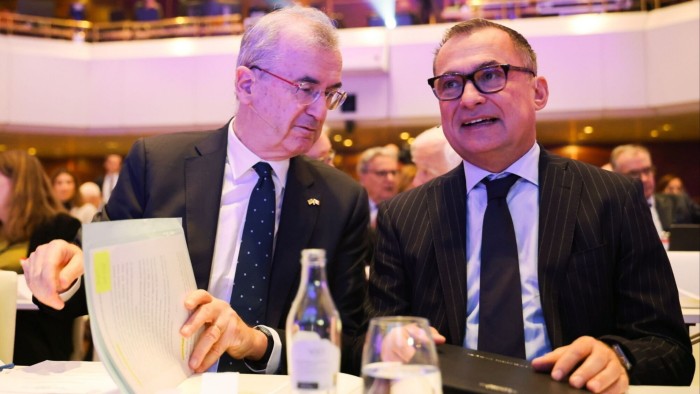Europe's leading central bankers issued a stark warning on Friday, highlighting the perilous state of the Eurozone economy and blaming political gridlock for exacerbating its vulnerabilities, particularly in the face of a potential US trade war. In an unprecedented joint statement, Joachim Nagel (Bundesbank President) and François Villeroy de Galhau (Banque de France Governor) sounded the alarm, declaring that a failure to revive Franco-German cooperation would condemn the continent to economic decline.
Their strongly worded op-ed, published simultaneously in the *Frankfurter Allgemeine Zeitung
and *Le Monde*, directly linked the economic challenges facing Europe to political inaction. They argued that Donald Trumpâs US presidential election victory, while not the sole cause, served as a critical wake-up call, underscoring the urgent need for decisive action. The piece emphasised the need for a renewed commitment to joint Franco-German initiatives, arguing that a lack of cooperation would be catastrophic.
The central bankersâ call for action focused on several key areas. They advocated for a deeper single market, the creation of a savings and investment union, a reduction in bureaucratic burdens, and increased cooperation on defence matters. Crucially, while acknowledging the debate surrounding shared European debt â a concept previously championed by former ECB President Mario Draghi â they argued that this wasn't a prerequisite for progress. Instead, they stressed the importance of prioritising readily available, cost-effective structural reforms.
Meanwhile, European Central Bank (ECB) President Christine Lagarde, in a separate address at the Frankfurt European Banking Congress, echoed these concerns, highlighting the critical need for capital markets reform. She expressed frustration at the lack of tangible progress despite mounting risks, sharply criticising Europe's "extraordinarily fragmented" financial markets. Lagarde accused vested interests of obstructing reforms, creating a situation where capital remains trapped within national borders or flows out to the US, leaving the EUâs economy even more exposed.
Lagarde pointed to the sheer volume of regulatory proposals and initiatives since 2015 â over 55 and 50 respectively â but lamented the lack of depth and substance. She attributed this failure to the influence of lobby groups who had successfully stymied meaningful change, resulting in a complex patchwork of national corporate, tax, and securities laws.
In his address to the same congress, Nagel further emphasised the potentially devastating consequences of a trade war, predicting significant GDP losses both in the US and globally, alongside increased inflation on both sides of the Atlantic. He also raised concerns about the "doom loop" â a vicious cycle whereby indebted governments and banks mutually reinforce each other's financial fragility â a challenge the Eurozone has yet to fully address.
In conclusion, the combined warnings from the EU's most senior central bankers represent a serious call to action. They highlight a critical juncture for the Eurozone economy, where political paralysis is directly hindering the ability to address mounting economic challenges and risks. The urgent need for decisive, coordinated action to reform the single market, strengthen its financial architecture, and foster greater Franco-German cooperation is undeniable. Failure to do so, they warn, could have devastating consequences for the entire continent.

